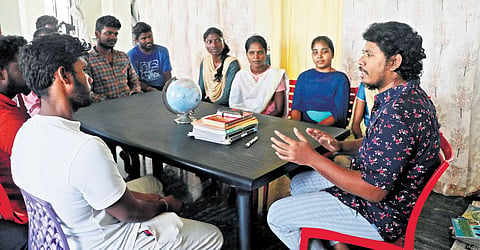

VILLUPURAM: For R Rajkumar, who gave up his IAS aspirations and opened a coaching centre for civil service aspirants in Villupuram, life has come a full circle. Praxis, as it is called, stems from the politico-philosophical concept that social change begins only when thought is refined and made into action. Opened in 2017, Praxis has become a household name in the district, not just for its coaching services offered at a bare minimum fee, but also for its library with a collection of 500-odd books that cover various disciplines like politics, sociology, philosophy and the like.
“Those who cannot afford private colleges go to government institutions; they are the ones comprising the larger proportion of our society, and for whose progress, the machinery of government works. So, is it not fair that they should have easier access to the study material required to become civil servants?
Back in 2015, Rajkumar had cleared the preliminary and main exams twice, but lost out in the final interview. “However, I had my plan B, which was to start a school in Villupuram to help rural students learn better. So, I started Praxis study hall as a precursor to it,” he adds.
While civil service aspirants can avail of full-time coaching at Praxis for a minimal fee, the library itself is free and open to all, and the books closely modelled on the UPSC syllabus. Rajkumar believes it can transform an ordinary individual into a social architect. “Unlike the way commercial coaching centres make it look, preparing for UPSC is not about learning tonnes of NCERT (National Council of Educational Research and Training) books by heart; if one paid attention it becomes evident that the syllabus includes varied approaches to problem solving an officer would handle on the ground, and I try the critical pedagogy method in approaching civil service preparation,” he says.
Thanks to Rajkumar’s novel approach and focus on accessibility, Praxis has seen steady enrolment of students from modest financial backgrounds, sometimes even from neighbouring districts. In the six years since it opened, three students trained at Praxis have cleared the Tamil Nadu Civil Services Group I, II and IV exams and have now been placed in different districts.
As of 2023, six more students have cleared the main examination for group IV and five students in group III. For Rajkumar, success is not about just a few students cracking service exams; it’s about empowering students to grasp concepts in their unique way, fostering confidence in facing the examination. “The conventional coaching centre model often leaves many students struggling to connect the subjects with their lives,” says Rajkumar. “Critical pedagogy enables students to think from their own backgrounds and lived experiences to solve problems.”A Tamil Nadu Public Service Commission aspirant said, “Rajkumar anna allows us to critically analyse schemes based on our knowledge bank, instead of forcing uniformed answers.”
A Deputy Superintendent of Police, a Praxis alumnus, commends the clarity and practical relevance of the education provided at the centre, which has significantly aided him in understanding and addressing real-world issues in his current role. “It has come in handy for me now as I am able to comprehend the issues much better.”
For Rajkumar, this endeavour is more than mere charity; it is a small yet significant step towards transforming his town. “I strongly believe that freedom to access knowledge by all equally is the ultimate purpose of the larger political state,” he concludes.
(Edited by Nikhil Jayakrishnan)